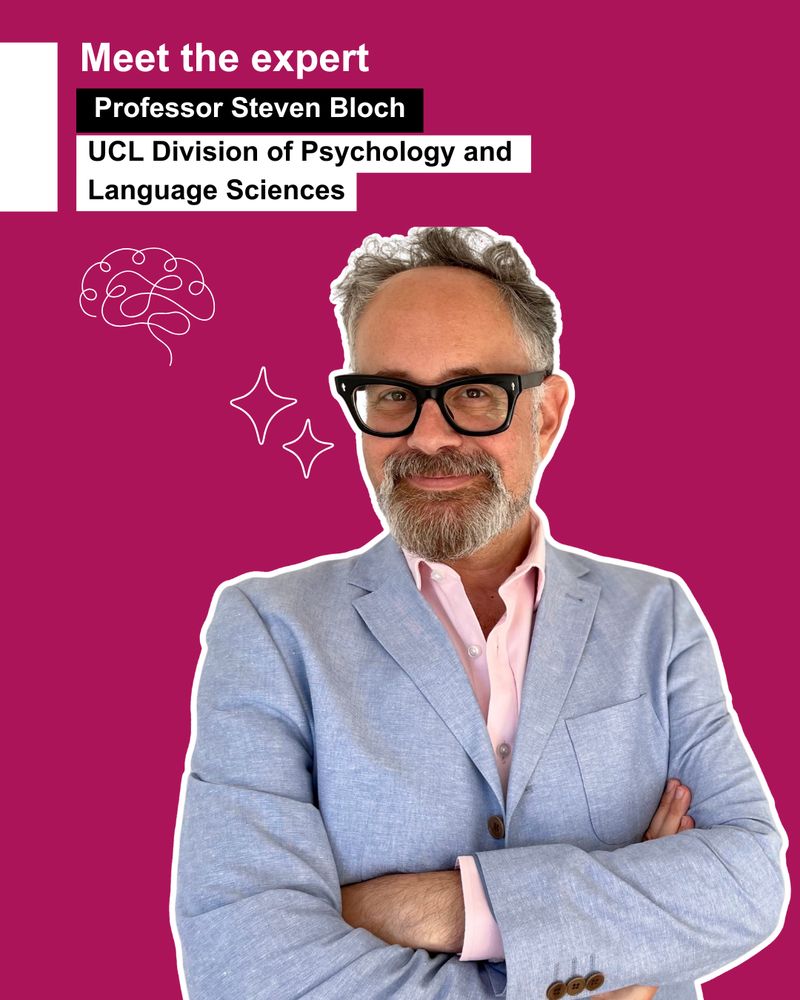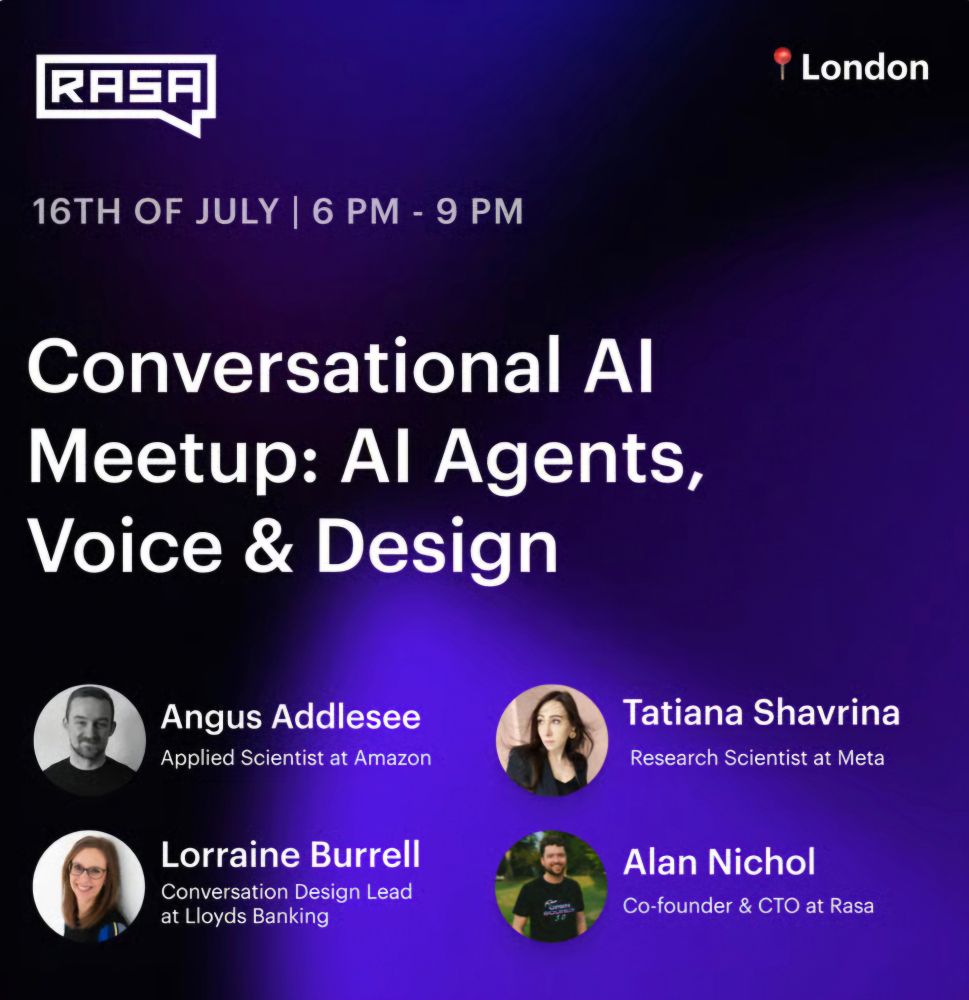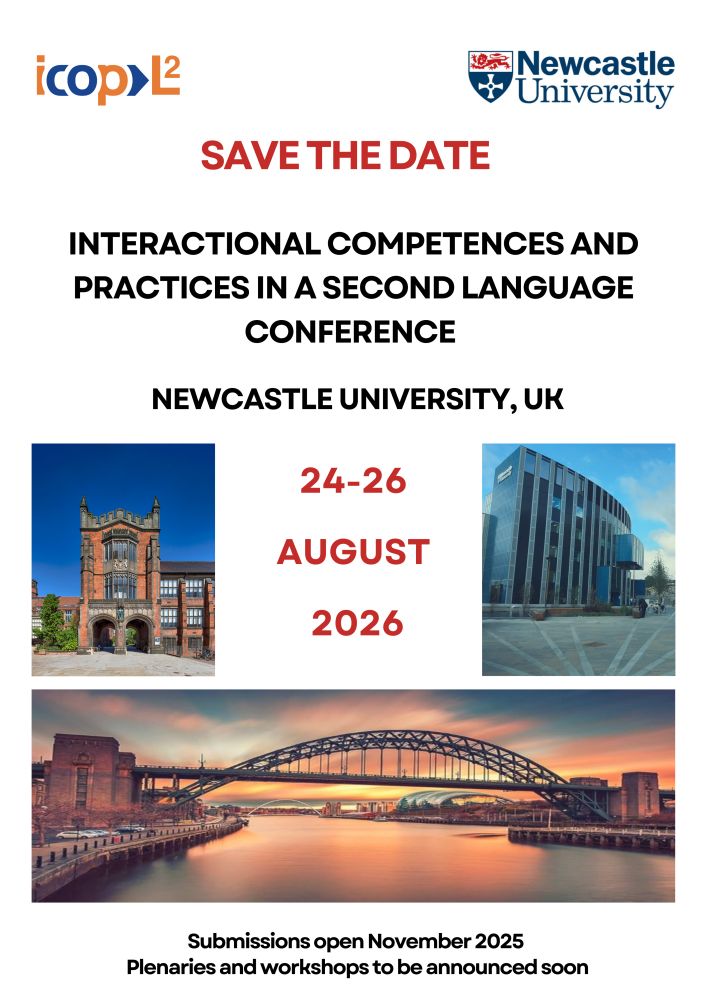
And for anyone fancying a little summer European tour, you can then hop over to Newcastle for ICOP-L2, 24-26 August:
conferences.ncl.ac.uk/icop-l2-26/
Among other delights, @spencerhazel.bsky.social and I will be leading a workshop on #EMCA and Conversational AI
04.12.2025 10:20 — 👍 1 🔁 0 💬 0 📌 0


Yet another in a great lineup of 2026 conferences relevant for the #EMCA folk looking at human-AI interaction:Sociolinguistics and AI, University of Copenhagen, 19-21 August:
cip.ku.dk/english/proj...
04.12.2025 10:17 — 👍 5 🔁 1 💬 1 📌 0
New book for #EMCA folk (and others) to enjoy
03.12.2025 15:27 — 👍 7 🔁 1 💬 0 📌 0

PAUSE sign
1. Pausing new submissions about AI topics for 90 days. That is, papers about AI models, testing AI models, proposing AI models, theories about the future of AI, etc. We will make exceptions for papers that are already accepted for publication (or published) in peer-reviewed scholarly journals
/2
27.11.2025 14:54 — 👍 99 🔁 21 💬 2 📌 8
Call for papers very relevant to #EMCA
12.11.2025 16:01 — 👍 9 🔁 2 💬 0 📌 0

One Strawberry Lane
Ground floor
Multi-function room 2A
Newcastle upon Tyne, NE1 4BX

Next Thursday, we will meet at this lovely room in One 🍓 Lane to explore together how our responses could help build a safe space for stories of racism.
#ESRCFestival
@newcastleuni.bsky.social @hassfacultyncl.bsky.social
Book your free ticket on Eventbrite 👇
www.eventbrite.co.uk/e/your-turn-...
28.10.2025 12:39 — 👍 6 🔁 3 💬 1 📌 0
Building Bridges
Building Bridges: A Symposium on Human-AI Interaction
Interdisciplinary symposium on human-AI interaction taking place at University of Warwick next month:
warwick.ac.uk/fac/cross_fa...
This will be relevant for the #EMCA and #conversationalAI communities. Attendance is online or in person. And free!
24.10.2025 10:09 — 👍 11 🔁 6 💬 0 📌 0
Anyone in the north-east area early next month may be interested in this workshop. Using #EMCA methods to explore with the public how to create safe spaces for stories of racist experiences to be hear.
10.10.2025 13:37 — 👍 2 🔁 0 💬 0 📌 0

This month we spoke to Professor Steven Bloch, expert in speech & language therapy and conversation analysis at @uclpals.bsky.social. We find out more about how he got into this fascinating field of research.
www.ucl.ac.uk/brain-scienc...
08.10.2025 10:08 — 👍 4 🔁 2 💬 0 📌 0

Sage Journals: Discover world-class research
Subscription and open access journals from Sage, the world's leading independent academic publisher.
A (now-defunct) AI bot makes calls to restaurants etc.
It was apparently pretty successful at call openings, second summonses, uh(m)s that precede a reason for the call, and other-initiated self-repair.
Authors: test actions, not intelligence. #EMCA
journals.sagepub.com/doi/full/10....
08.10.2025 07:51 — 👍 5 🔁 4 💬 0 📌 0
AGF 2026 | IDS
#EMCA alert!
The 25th Conference on Discourse and Conversation Analysis is taking place 25-27 March 2026 in Mannheim, Germany.
The theme is Technology Use and Social Interaction, and it has a fantastic lineup of keynote speakers and workshop leads!
www.ids-mannheim.de/aktuell/vera...
09.10.2025 14:59 — 👍 14 🔁 10 💬 0 📌 0

Meme showing a worker labelled "academic staff" digging a hole in the ground while 10 others look labelled with management titles such as "Director of Human Resources" look on. The caption underneath reads "The only way we can cut costs is to reduce the number of academic staff..."
A meme for the modern university...
29.09.2025 20:44 — 👍 294 🔁 109 💬 8 📌 9

Image of event poster with speakers
18:15 – 18:45 | Angus Addlesee — Applied Scientist at Amazon
🤖 Deploying an LLM-Based Conversational Agent on a Hospital Robot
Real-world challenges and insights from deploying a voice-enabled robot in a clinical setting.
18:50 – 19:15 | Tatiana Shavrina, PhD — Research Scientist at Meta
🔬From conversational AI to autonomous scientific discovery with AI Agents.
The talk will cover the overview of the current challenges and new opportunities for LLM and LLM-based Agents.
19:15 – 19:30 | Short Break ☕
19:30 – 19:55 | Lorraine Burrell — Conversation Design Lead at Lloyds Banking
Talk TBA
20:00 – 20:30 | Alan Nichol — Co-founder & CTO at Rasa
🔧 Why Tool Calling Breaks Your AI Agents—and What to Do Instead
Explore the pitfalls of tool use in agent design and how to avoid them.
#EMCA folks - if you're working on #chatbots or other conversational technologies and are in London on 16th July, this event looks fantastic!
#Conversational #AI Meetup London, Weds 16th July, 18.00.
Including a talk on LLM-Based conversational agents in hospital robots
🔗 lu.ma/5zzqtt33
20.06.2025 07:13 — 👍 4 🔁 1 💬 1 📌 0

🚨Save the date!🚨
🗣️Spread the word! 🗣️
The next ICOP-L2 conference will be held at Newcastle University on 🗓️24-26 August 2026🗓️
icopl2.org
More details on plenary speakers, workshops, the call for abstracts, and more, coming soon!
#EMCA #L2interaction
06.06.2025 11:19 — 👍 3 🔁 2 💬 0 📌 0
Thank you Liz! ❤️
29.05.2025 10:36 — 👍 1 🔁 0 💬 0 📌 0
Super interesting (and useful) Special Section of ROLSI on all things ethics and data collection for #EMCA research.
Well done (and thank you!) to all involved in putting this together.
28.05.2025 08:46 — 👍 7 🔁 1 💬 1 📌 0

Sign the Petition
End unnecessary redundancies at Newcastle University
Please read and kindly consider signing in support of academics at Newcastle University (including from our team in Applied Linguistics & Communication) who are facing the threat of redundancy this summer:
www.change.org/p/end-unnece...
23.05.2025 11:01 — 👍 8 🔁 7 💬 0 📌 1
We are looking for CLAN and ELAN users interested in converting 1 or 2 transcripts to the DOTE format. We have tested a Python script the last couple of days - and it would be interesting to try with some "real" data. Please get in touch. #DOTE #ELAN #CLAN #transcription #EMCA #VIDEO
23.05.2025 11:35 — 👍 4 🔁 5 💬 2 📌 0

Sign the Petition
End unnecessary redundancies at Newcastle University
Please read and kindly consider signing in support of academics at Newcastle University (including from our team in Applied Linguistics & Communication) who are facing the threat of redundancy this summer:
www.change.org/p/end-unnece...
23.05.2025 11:01 — 👍 8 🔁 7 💬 0 📌 1
This sounds fantastic!
11.04.2025 11:34 — 👍 3 🔁 0 💬 0 📌 0
![Preamble
All research at our institution, from ideation and execution to analysis and reporting, is bound by the Netherlands Code of Conduct for Research Integrity. This code specifies five core values that organise and inform research conduct: Honesty, Scrupulousness, Transparency, Independence and Responsibility.
One way to summarise the guidelines in this document is to say they are about taking these core values seriously. When it comes to using Generative AI in or for research, the question is if and how this can be done honestly, scrupulously, transparently, independently, and responsibly.
A key ethical challenge is that most current Generative AI undermines these values by design [3–5; details below]. Input data is legally questionable; output reproduces biases and erases authorship; fine-tuning involves exploitation; access is gated; versioning is opaque; and use taxes the environment.
While most of these issues apply across societal spheres, there is something especially pernicious about text generators in academia, where writing is not merely an output format but a means of thinking, crediting, arguing, and structuring thoughts. Hollowing out these skills carries foundational risks.
A common argument for Generative AI is a promise of higher productivity [5]. Yet productivity does not equal insight, and when kept unchecked it may hinder innovation and creativity [6, 7]. We do not need more papers, faster; we rather need more thoughtful, deep work, also known as slow science [8–10].
For these reasons, the first principle when it comes to Generative AI is to not use it unless you can do so honestly, scrupulously, transparently, independently and responsibly. The ubiquity of tools like ChatGPT is no reason to skimp on standards of research integrity; if anything, it requires more vigilance.](https://cdn.bsky.app/img/feed_thumbnail/plain/did:plc:tfyqeo3tprov5lejatxoi6lb/bafkreidtloh77ocmijnfeddey4fmme43s2mhahdpmr7otrrmvpzjca5kn4@jpeg)
Preamble
All research at our institution, from ideation and execution to analysis and reporting, is bound by the Netherlands Code of Conduct for Research Integrity. This code specifies five core values that organise and inform research conduct: Honesty, Scrupulousness, Transparency, Independence and Responsibility.
One way to summarise the guidelines in this document is to say they are about taking these core values seriously. When it comes to using Generative AI in or for research, the question is if and how this can be done honestly, scrupulously, transparently, independently, and responsibly.
A key ethical challenge is that most current Generative AI undermines these values by design [3–5; details below]. Input data is legally questionable; output reproduces biases and erases authorship; fine-tuning involves exploitation; access is gated; versioning is opaque; and use taxes the environment.
While most of these issues apply across societal spheres, there is something especially pernicious about text generators in academia, where writing is not merely an output format but a means of thinking, crediting, arguing, and structuring thoughts. Hollowing out these skills carries foundational risks.
A common argument for Generative AI is a promise of higher productivity [5]. Yet productivity does not equal insight, and when kept unchecked it may hinder innovation and creativity [6, 7]. We do not need more papers, faster; we rather need more thoughtful, deep work, also known as slow science [8–10].
For these reasons, the first principle when it comes to Generative AI is to not use it unless you can do so honestly, scrupulously, transparently, independently and responsibly. The ubiquity of tools like ChatGPT is no reason to skimp on standards of research integrity; if anything, it requires more vigilance.
A year ago our faculty commissioned & adopted guidance on GenAI and research integrity. Preamble below, pdf at osf.io/preprints/os..., text also at ideophone.org/generative-a...
Key to these guidelines is a values-first rather than a technology-first approach, based on NL code of research conduct
09.04.2025 09:45 — 👍 86 🔁 45 💬 6 📌 4
My reading of it would definitely be Alexa's first reading (we use 'us' that way round these parts, and I can imagine someone saying this with this meaning here, although can't say it's common).
07.03.2025 11:13 — 👍 2 🔁 0 💬 0 📌 0
I’m sorry you had that experience, but “No cabs” is a beautiful, almost poetic, ending (for us as readers - hope you didn’t end up having to walk!).
27.02.2025 13:33 — 👍 2 🔁 0 💬 0 📌 0
No we didn’t, but that’s a lesson learned for next time.
23.02.2025 21:31 — 👍 1 🔁 0 💬 0 📌 0
As promised, here are the slides I shared with students to convince them to NOT use chatGPT and other artificial stupidity.
TL;DR? AI is evil, unsustainable and stupid, and I'd much rather they use their own brains, make their own mistakes, and actually learn something. 🪄
23.02.2025 13:45 — 👍 5649 🔁 2125 💬 238 📌 115
interested in social interaction in everyday and classroom settings @ university of potsdam, digilte.org team member, she/her
Early-career Fellow, Institute of Advanced Study | PhD Applied Linguistics, University of Warwick | MA Applied Linguistics, UCL | Conversation Analyst | FHEA | Institutional Representative for Warwick, British Academy Early-career Researcher Network
English Language Instructor. Interested in conversation analysis, video-mediated interaction, language teacher education.
Interdisciplinary research project funded by the European Union that explores the neurocognitive and social impacts of foreign-accented speech in human-human and human-AI interactions.
More info: https://cordis.europa.eu/project/id/101226709
Phonetics & Phonology Research Group at Newcastle University. Researchers uniting around language and sound. For enquiries, please contact us at phoneticsphonology.ncl@gmail.com.
Associate Professor in Language Education, The University of Edinburgh, UK. Book review co-Editor for Language Policy.
Applied Linguistics | Language Policy | Conversation Analysis | Translanguaging | French Heritage Language Education
Academic in London. Anti-fascist, electronic music and raving and all things culture lover. Entirely personal views, laughs, and rants here.
Senior Lecturer of Applied Linguistics, Newcastle University.
Multimodal Conversation Analysis researcher. I investigate social interactions in second language teaching, learning and testing settings. And interactions involving people with dementia.
Directions in Ethnomethodology & Conversation Analysis (Routledge)
https://www.routledge.com/Directions-in-Ethnomethodology-and-Conversation-Analysis/book-series/ASHSER1190
@AndrewCarlin3 (X)
#EMCA #MCA
#HaroldGarfinkel
#EdwardRose
#HarveySacks
Lecturer in Applied Linguistics and TESOL at Newcastle University, UK | Lang. Teacher Trainer | CA classroom interaction | Plant-based 🌱, theatre lover 🎭 | Chilean🇨🇱
PhD candidate at University of Nottingham || Conversation Analysis || Health Communication || Remote Primary Care
A collaborative project to discuss learning & teaching in HE with the wider community via tweetchats, first #lthechat 29.10.14, Wed 8-9pm UK time, join us!
Loughborough University (UK). Research on language and social interaction, conversation analysis, communication in palliative and end-of-life care, gender in social interaction
Associate Professor | NIHR Fellow | Conversation Analyst | University of Oxford | Green Templeton College | Working to improve communication in health care encounters | @OxPrimaryCare | #ILEMCA
For the people AI leaves behind. A multidimensional, community-based effort to strengthen local justice movements + build long-term power. Launched 11/19/24. Founder: @kevindeliban.bsky.social
Launch report: www.techtonicjustice.org/reports/inescapable-ai
Postdoc Researcher at Mälardalen University














![Preamble
All research at our institution, from ideation and execution to analysis and reporting, is bound by the Netherlands Code of Conduct for Research Integrity. This code specifies five core values that organise and inform research conduct: Honesty, Scrupulousness, Transparency, Independence and Responsibility.
One way to summarise the guidelines in this document is to say they are about taking these core values seriously. When it comes to using Generative AI in or for research, the question is if and how this can be done honestly, scrupulously, transparently, independently, and responsibly.
A key ethical challenge is that most current Generative AI undermines these values by design [3–5; details below]. Input data is legally questionable; output reproduces biases and erases authorship; fine-tuning involves exploitation; access is gated; versioning is opaque; and use taxes the environment.
While most of these issues apply across societal spheres, there is something especially pernicious about text generators in academia, where writing is not merely an output format but a means of thinking, crediting, arguing, and structuring thoughts. Hollowing out these skills carries foundational risks.
A common argument for Generative AI is a promise of higher productivity [5]. Yet productivity does not equal insight, and when kept unchecked it may hinder innovation and creativity [6, 7]. We do not need more papers, faster; we rather need more thoughtful, deep work, also known as slow science [8–10].
For these reasons, the first principle when it comes to Generative AI is to not use it unless you can do so honestly, scrupulously, transparently, independently and responsibly. The ubiquity of tools like ChatGPT is no reason to skimp on standards of research integrity; if anything, it requires more vigilance.](https://cdn.bsky.app/img/feed_thumbnail/plain/did:plc:tfyqeo3tprov5lejatxoi6lb/bafkreidtloh77ocmijnfeddey4fmme43s2mhahdpmr7otrrmvpzjca5kn4@jpeg)

